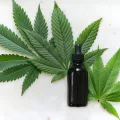Jump to Section
Understanding CBD Oil
CBD oil, or cannabidiol, is a natural compound derived from the cannabis plant.
Unlike its cousin THC, CBD does not cause a high and is legal in many parts of the world.
CBD oil is commonly used to treat anxiety, depression, pain, and sleep disorders.
However, before starting any new medication, it’s important to understand how it interacts with other drugs.
The Rise of CBD Oil Use
Over the past few years, CBD oil has become increasingly popular.
It’s estimated that 64 million Americans have tried CBD in some form, according to a 2019 Gallup Poll.
As CBD use continues to rise, it’s important to be aware of the potential interactions it may have with other medications.
Potential Interactions with Other Medications
CBD oil can interact with other medications in several ways.
It can alter the way the liver metabolizes drugs, which can lead to higher levels of the drug in the bloodstream.
This can cause unwanted side effects or make the medication less effective.
Additionally, CBD can interact with receptors in the body and cause changes in the way drugs are absorbed, distributed, metabolized, and eliminated.
Drug Classes to Watch Out For
It’s important to be aware of which drug classes may interact with CBD oil. Some of the most common include:
| Drug Class | Example Drugs |
|---|---|
| Blood Thinners | Warfarin, Heparin |
| Antipsychotics | Haloperidol, Risperidone |
| Antidepressants | Fluoxetine, Sertraline |
| Benzodiazepines | Alprazolam, Diazepam |
| Calcium Channel Blockers | Amlodipine, Nifedipine |
Tips for Safe CBD Oil Use with Medications
To minimize the risk of interactions, there are several tips to keep in mind when using CBD oil with other medications:
- Start with a low dose of CBD and increase slowly over time.
- Talk to your healthcare provider before starting or stopping any medications.
- Monitor any side effects or changes in how your medications work.
- Look for high-quality CBD products that have been third-party tested.
- Avoid taking CBD with alcohol or grapefruit juice, which can also affect how medications are metabolized.
Consultation with Healthcare Provider Before Use
Before adding CBD oil to your medication regimen, it’s important to talk to your healthcare provider.
They can help you determine if CBD is safe for you and whether any dosage adjustments or medication changes are necessary.
It’s important to be honest about all medications, supplements, and health conditions you have to ensure the best possible care.
FAQ
Can I take CBD oil with blood thinners?
CBD can increase the risk of bleeding when taken with blood thinners like warfarin or heparin.
It’s important to talk to your healthcare provider before taking CBD if you’re on blood thinners.
Can I take CBD oil with antidepressants?
CBD oil can increase the levels of certain antidepressants in the bloodstream, which can cause unwanted side effects.
It’s important to talk to your healthcare provider before taking CBD if you’re on antidepressants.
Can I take CBD oil with pain medications?
CBD oil can enhance the effects of some pain medications, so it’s important to talk to your healthcare provider before taking CBD if you’re on pain medications.
Can I take CBD oil with benzodiazepines?
CBD oil can increase the risk of sedation when taken with benzodiazepines like alprazolam or diazepam.
It’s important to talk to your healthcare provider before taking CBD if you’re on benzodiazepines.
Can I take CBD oil with calcium channel blockers?
CBD oil can increase the levels of some calcium channel blockers in the bloodstream, which can cause unwanted side effects.
It’s important to talk to your healthcare provider before taking CBD if you’re on calcium channel blockers.
Can I take CBD oil with other medications?
CBD oil can interact with many other medications, including over-the-counter drugs and supplements.
It’s important to talk to your healthcare provider before taking CBD if you’re on any other medications.
I am a CBD enthusiast and creator of DJ Hemp who has made it my mission to enlighten the world about the cannabis industry through thought-provoking literary works.
I have successfully fostered an open-minded, inquisitive community that is eager to learn more about the potential benefits of CBD.
Contact me at [email protected] for assistance.





